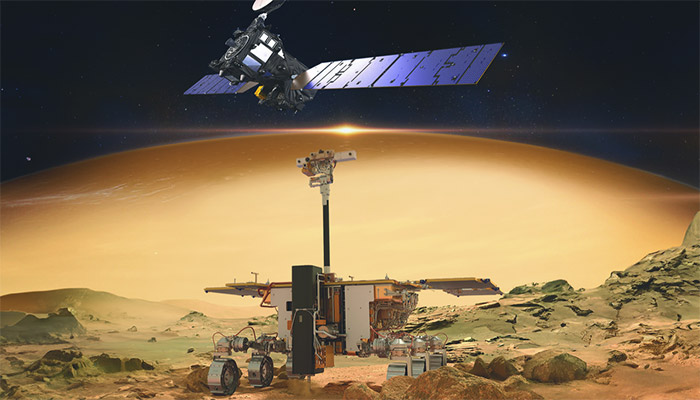Thales Alenia Space has signed a contract with the European Space Agency to continue work to take a European rover to search for traces of life on Mars
• The European mission to Mars is restarting thanks to the determination of the European Space Agency supported by the Italian Space Agency, the UK Space Agency and a renewed partnership with NASA, with the mission’s original science objectives preserved.
• ExoMars 2028 is an unprecedented scientific and technological challenge, from the use of innovative materials for thermal protection during entry into Mars’s atmosphere to the development of software for navigation, control and landing on the planet’s surface.
• The results of these technological challenges will make a fundamental contribution to the ongoing robotic and human exploration of the Red Planet and Solar System.
Turin, April 9, 2024 – Thales Alenia Space, a joint venture between Thales (67%) and Leonardo (33%), has signed a framework contract divided into different tranches with the European Space Agency (ESA), worth a total of €522m, to continue essential activities for the completion of the ExoMars 2028 mission. The contract includes the development of the Mars Entry, Descent and Landing Module (EDLM) and maintenance activities on vehicles already built for the 2022 mission.
The upcoming ExoMars mission, set for launch from the Kennedy Space Center between October and December 2028, will explore the Martian surface in search of signs of past life, a quest that has long fascinated humanity. Led by ESA with a major involvement by NASA, ExoMars 2028 will deliver a European rover capable of autonomous driving on the planet’s surface. Scheduled to reach Mars in 2030 after a long voyage, the rover, fitted with a drill developed by Leonardo, will collect soil samples by drilling into the Martian soil up to 2 meters deep and will analyze their chemical, physical and biological properties using its advanced Analytical Laboratory Drawer (ALD) developed by Thales Alenia Space. One of the mission objectives is to search for subsurface bacteria, living or fossilized, which would be evidence of extant or previous life on the Red Planet.





Be the first to comment on "The search for life on Mars goes on with ExoMars 2028"